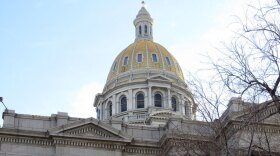Oil drilling on Colorado's populous Front Range has forced more interactions between communities and the energy industry – and that's caused tension. At the recent annual , one of the discussions centered on how to improve relations between the industry and the public.
It's an ongoing issue that the state will tackle in a new rule making hearing.
"Folks really don't like surprises as they relate to oil and gas… and I will concede sometimes I'm surprised by what surprises people," Matt Lepore, the head of the state's regulator, the Colorado Oil and Gas Conservation Commission, told the crowd at the summit. "That if you buy a home in rural Weld County, even if you're in a municipality, you're stunned and amazed when the oil and gas rig shows up, but it happens all the time."
One way the proposed rule changes could help would be by including future oil and gas drilling sites in city and county planning and development processes. Right now that doesn't always happen.
"It does seem like they're often eager to approve that new subdivision without maybe fully vetting or considering how the mineral owner will be able to access those minerals," said Lepore.
Another suggested rule change would require mediation and more collaboration for large drill sites located near buildings and homes. That catch is that even the definition of a large drill site is hard to pin down and mandating good communication is no easy task.
"We're being asked to regulate, sort of being a good neighbor," said Lepore.
But that's necessary according to the Democratic Speaker of the House.
"I think there are certain industry members have gotten better at communicating," said House Speaker Dickey Lee Hullinghorst (D-Boulder). "There are still some bad actors out there and unfortunately we have to write legislation and regulations to those people who aren't being the best actors."
Hullinghorst has pushed for cities and towns to have the ultimate decision making power on whether or not to allow drilling. Right now that final decision rests with the state. She said getting everyone to talk to each other has just been just one part of the problem.
"I think it's a whole lot more than that," the speaker said. "We've had huge issues in Colorado with the interface between a very heavy industrial activity and residents."
For Hullinghorst, it's too early to say what may happen when lawmakers return to the state capitol in January 2016. She notes that the debate over drilling has quieted down because people are waiting to see the new rules from the Oil and Gas Conservation Commission. Hullinghorst also thinks the oil price slump has had a calming effect.
"The fracking activity is actually reduced, primarily because of the price of gas and the huge boom in the Pennsylvania area where the transportation has been easier," said Hullinghorst.
After a series of preliminary meetings with local officials across the state, the new COGCC rules should become final before the end of 2015 after the public weighs in. The will be open to the public and will take place Nov. 16 & 17, and Dec. 7 & 8. There are hopes the rules will smooth some of the conflict between residents, towns, and energy companies. If not, there are groups interested in putting an anti-fracking measure to a statewide vote, or a possible legislative fix.







